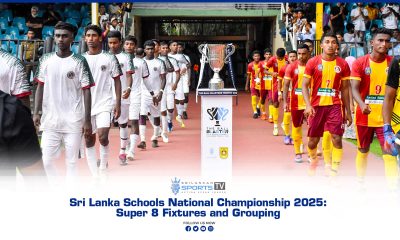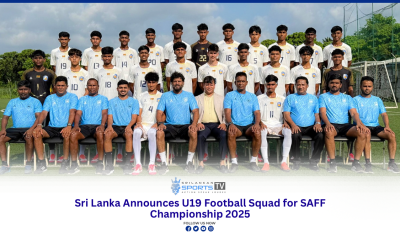News
What is the latest Impact Player rule in cricket?
The BCCI is set to introduce the Impact Player rule in the upcoming season of the Syed Mushtaq Ali Trophy domestic men’s T20 tournament, which begins on October 11.
What exactly is this law?
Each team will nominate four substitutes on the team sheets at the toss, only one of whom may be used as an Impact Player during the match. Both teams can only use one Impact Player. This is not mandatory.
An Impact Player can replace any player in the starting XI before the 14th over of an innings. The captain, head coach or manager must inform the on-field or fourth umpire before the end of the current over. A batting team can introduce an Impact Player when a wicket falls or at the break of the innings. After an Impact Player is introduced in a match, the player can bat and bowl his entire four overs in consecutive innings. If a player is injured, the Impact Player can only be introduced at the end of the over in progress and is eligible to bat. Only 11 players can bat at any time.
Can the substitute continue to participate in the game?
No, the substitute can no longer participate in the game – not even as a substitute keeper. But if a player is injured while fielding in the middle of an innings, the current playing conditions will apply as calculated under MCC Law 24.1 – Replacement Keepers. However, if the injured player is replaced by an Impact Player, he can no longer participate in the match. Otherwise, the Impact Player can be introduced only after the end of the innings for the fielding side.
If an Impact Player is used by a team and an injury occurs, MCC Law 24 – Fielder’s Absence; Substitutes – will be implemented. If the umpires are satisfied that a fielding player is injured or ill during the match, a substitute fielding player will be allowed to field in place of an injured player. The substitute should not bowl or act as captain.
Will Impact Player Rule be used in IPL 2023?
There is no official communication on whether BCCI plans to introduce the rule in IPL.
ක්රිකට් ක්රීඩාවට අලුතෙන්ම එන Impact Player නීතිය කුමක්ද?
BCCI විසින් ඔක්තෝම්බර් 11 වනදා ආරම්භ වන Syed Mushtaq Ali Trophy දේශීය පිරිමි T20 තරඟාවලියේ ඉදිරි වාරයේදී Impact Player නීතිය හඳුන්වා දීමට නියමිතයි.
ඇත්තටම මොකක්ද මේ නීතිය
සෑම කණ්ඩායමක්ම කාසියේ වාසියේ දී කණ්ඩායම් පත්රවල ආදේශක හතරක් නම් කරනු ඇති අතර, ඔවුන්ගෙන් එක් අයෙකු පමණක් තරඟය අතරතුර Impact Player ලෙස භාවිතා කළ හැකිය. කණ්ඩායම් දෙකටම භාවිතා කළ හැක්කේ එක් Impact Player එකක් පමණි. මෙය අනිවාර්ය නොවේ.
Impact Player හට ඉනිමක 14 වැනි ඕවරයට පෙර ආරම්භක XI හි සිටින ඕනෑම ක්රීඩකයෙකු ආදේශ කළ හැකිය. නායකයා, ප්රධාන පුහුණුකරු හෝ කළමනාකරු වත්මන් ඕවරය අවසන් වීමට පෙර පිටියේ සිටින හෝ සිවුවැනි විනිසුරුට දැනුම් දිය යුතුය. පන්දුවට පහර දෙන කණ්ඩායමකට කඩුල්ලක් වැටෙන විට හෝ ඉනිමේ විවේකයේදී Impact Player එකක් හඳුන්වා දිය හැකිය. තරඟයකදී Impact Player හඳුන්වා දීමෙන් පසු, ක්රීඩකයාට පන්දුවට පහර දිය හැකි අතර ඔහුගේ සම්පූර්ණ ඕවර හතරම අඛණ්ඩ ඉනිමකදී යැවීමට හැකිය. ක්රීඩකයෙකු ආබාධයට ලක් වන්නේ නම්, Impact Player හඳුන්වා දිය හැක්කේ ක්රියාත්මක වෙමින් පවතින ඕවරය අවසානයේ පමණක් වන අතර පන්දුවට පහර දීමට සුදුසුකම් ලබයි. ඕනෑම අවස්ථාවක පන්දුවට පහර දිය හැක්කේ ක්රීඩකයින් 11 දෙනෙකුට පමණි.
ආදේශක ක්රීඩකයාට තවදුරටත් ක්රීඩාවට සහභාගි විය හැකිද?
නැත, ආදේශක ක්රීඩකයාට තවදුරටත් ක්රීඩාවට සහභාගී විය නොහැක – ආදේශක පන්දු රකින්නෙකු ලෙස පවා නොවේ. නමුත් පන්දුවාරයක් මැද පන්දු රකිමින් සිටියදී ක්රීඩකයෙකු ආබාධයකට ලක් වුවහොත්, MCC නීතිය 24.1 – ආදේශක පන්දු රකින්නන් යටතේ ගණනය කර ඇති පරිදි වත්මන් ක්රීඩා කොන්දේසි ක්රියාත්මක වේ. කෙසේ වෙතත්, තුවාල ලැබූ ක්රීඩකයා වෙනුවට Impact Player නම්, ඔහුට තවදුරටත් තරඟයට සහභාගී විය නොහැක. එසේ නොමැතිනම්, Impact Player හඳුන්වා දිය හැක්කේ පන්දු රකින පැත්ත සඳහා පන්දුවාරය අවසන් වූ පසුව පමණි.
Impact Player කණ්ඩායමක් විසින් භාවිතා කර ආබාධයක් සිදුවුවහොත්, MCC නීතිය 24 – ෆීල්ඩර් නොපැමිණීම; ආදේශක – ක්රියාත්මක වනු ඇත. තරඟය අතරතුර පන්දු රකින ක්රීඩකයෙකු ආබාධයකට ලක්ව හෝ රෝගාතුර වූ බවට විනිසුරුවන් සෑහීමකට පත් වුවහොත්, ආබාධයකට ලක් වූ ක්රීඩකයෙකු වෙනුවට ආදේශක පන්දු රකින්නෙකුට පන්දු රැකීමට අවසර ලැබේ. ආදේශකයා පන්දු යැවීම හෝ නායකයා ලෙස කටයුතු නොකළ යුතුය.
IPL 2023 දී Impact Player නීතිය භාවිතා කරයිද?
BCCI IPL හි රීතිය හඳුන්වා දීමට සැලසුම් කරන්නේද යන්න පිළිබඳව නිල සන්නිවේදනයක් නොමැත.
கிரிக்கெட்டில் சமீபத்திய தாக்க வீரர் விதி என்ன?
அக்டோபர் 11 ஆம் தேதி தொடங்கும் சையத் முஷ்டாக் அலி டிராபி உள்நாட்டு ஆடவர் டி20 போட்டியின் வரவிருக்கும் சீசனில் இம்பாக்ட் பிளேயர் விதியை பிசிசிஐ அறிமுகப்படுத்த உள்ளது.
இந்த சட்டம் சரியாக என்ன?
ஒவ்வொரு அணியும் நாணயச் சுழற்சியில் அணித் தாள்களில் நான்கு மாற்று வீரர்களை பரிந்துரைக்கும், அவர்களில் ஒருவரை மட்டுமே போட்டியின் போது இம்பாக்ட் பிளேயராகப் பயன்படுத்தலாம். இரு அணிகளும் ஒரு தாக்க வீரரை மட்டுமே பயன்படுத்த முடியும். இது கட்டாயமில்லை.
ஒரு இன்னிங்ஸின் 14வது ஓவருக்கு முன் தொடக்க XI இல் உள்ள எந்த வீரரையும் ஒரு தாக்க வீரர் மாற்ற முடியும். கேப்டன், தலைமைப் பயிற்சியாளர் அல்லது மேலாளர் தற்போதைய ஓவர் முடிவதற்குள் களத்தில் இருக்கும் அல்லது நான்காவது நடுவருக்குத் தெரிவிக்க வேண்டும். ஒரு விக்கெட் விழும்போது அல்லது இன்னிங்ஸின் இடைவேளையின் போது ஒரு பேட்டிங் டீம் ஒரு தாக்க வீரரை அறிமுகப்படுத்தலாம். ஒரு போட்டியில் இம்பாக்ட் ப்ளேயர் அறிமுகப்படுத்தப்பட்ட பிறகு, அந்த வீரர் தனது நான்கு ஓவர்களையும் ஒரு தொடர்ச்சியான இன்னிங்ஸில் பேட் செய்து பந்து வீச முடியும். ஒரு வீரர் காயம் அடைந்தால், இம்பாக்ட் பிளேயரை ஓவரின் முடிவில் மட்டுமே அறிமுகப்படுத்த முடியும் மற்றும் அவர் பேட்டிங் செய்ய தகுதியுடையவர். எந்த நேரத்திலும் 11 வீரர்கள் மட்டுமே பேட்டிங் செய்ய முடியும்.
மாற்று வீரர் விளையாட்டில் தொடர்ந்து பங்கேற்க முடியுமா?
இல்லை, மாற்று வீரர் இனி விளையாட்டில் பங்கேற்க முடியாது – மாற்று கீப்பராக கூட இல்லை. ஆனால் ஒரு இன்னிங்ஸின் நடுவில் பீல்டிங் செய்யும் போது ஒரு வீரர் காயம் அடைந்தால், MCC சட்டம் 24.1 – ரீப்ளேஸ்மென்ட் கீப்பர்களின் கீழ் கணக்கிடப்பட்ட தற்போதைய ஆட்ட நிலைமைகள் பொருந்தும். இருப்பினும், காயம்பட்ட வீரருக்குப் பதிலாக இம்பாக்ட் பிளேயர் சேர்க்கப்பட்டால், அவர் இனி போட்டியில் பங்கேற்க முடியாது. இல்லையெனில், ஃபீல்டிங் தரப்புக்கு இன்னிங்ஸ் முடிந்த பிறகுதான் இம்பாக்ட் பிளேயரை அறிமுகப்படுத்த முடியும்.
ஒரு இம்பாக்ட் பிளேயர் அணியால் பயன்படுத்தப்பட்டு காயம் ஏற்பட்டால், MCC சட்டம் 24 – ஃபீல்டர் இல்லாதது; மாற்றுகள் – செயல்படுத்தப்படும். போட்டியின் போது ஒரு பீல்டிங் வீரர் காயம் அல்லது உடல்நிலை சரியில்லாமல் இருப்பதாக நடுவர்கள் திருப்தி அடைந்தால், காயமடைந்த வீரருக்கு பதிலாக மாற்று பீல்டிங் வீரர் பீல்டிங் செய்ய அனுமதிக்கப்படுவார். மாற்று வீரர் பந்துவீசவோ அல்லது கேப்டனாக செயல்படவோ கூடாது.
IPL 2023 இல் Impact Player Rule பயன்படுத்தப்படுமா?
பிசிசிஐ ஐபிஎல்லில் விதியை அறிமுகப்படுத்த திட்டமிட்டுள்ளதா என்பது குறித்து அதிகாரப்பூர்வ தகவல் எதுவும் இல்லை.
Cricket
England Begin Super Eights with Statement Win as Sri Lanka Falter in Chase
Sri Lanka’s Super Eight campaign at the T20 World Cup 2026 suffered a major blow in Kandy on Sunday, as co-hosts fell to a comprehensive 51-run defeat against England cricket team, leaving their semi-final prospects under pressure.
Electing to field first on a slow pitch at the Pallekele International Cricket Stadium, Sri Lanka’s bowlers made early inroads and restricted England to 146/9, defending a modest total with a disciplined effort that saw several tight overs in the middle phase.
Phil Salt was the standout performer with the bat for England, anchoring their innings with a crucial 62 off 36 balls, while other batters struggled to accelerate.
However, it was England’s bowling and fielding — led by an impressive all-round showing from Will Jacks — that ultimately decided the contest. Jacks’ left-arm spin delivered a match-turning spell of 3/22 in four overs, and he also chipped in with vital lower-order runs that helped tilt the momentum fully in England’s favour.
“I thought we executed our plans really well with the ball,” Jacks said after being named Player of the Match. “We knew the conditions would be tough, and credit to our bowlers for sticking to their lengths and building pressure.”
Sri Lanka’s Chase Falls Apart
Chasing a target of 147, Sri Lanka never recovered from a top-order collapse. After losing early wickets in the Powerplay, the home side slumped to 34/5, leaving the middle and lower order with an uphill task.
Captain Dasun Shanaka was among the few who offered resistance, scoring a gritty 30, but there was little support around him as the innings deteriorated rapidly. Sri Lanka were eventually bundled out for 95 in 16.4 overs, failing to adapt to England’s bowling pressure on a slow surface.
“It’s disappointing,” Shanaka said post-match. “We knew runs wouldn’t come easy, but we didn’t build partnerships. We let ourselves down in crucial moments.”
What It Means for Sri Lanka
England’s victory gives them a valuable boost in Super Eight Group 2, strengthening their bid for a semi-final spot. For Sri Lanka, the loss raises questions about their batting depth and ability to chase under pressure, especially after entering the Super Eights with solid momentum from the group stage.
With their next match looming, Sri Lanka must regroup quickly if they are to keep their World Cup ambitions alive on home soil.
Cricket
Sri Lanka Stunned by Zimbabwe Despite 178 as Bowling Falters in Colombo
Sri Lanka’s T20 World Cup campaign suffered a major setback as they went down to Zimbabwe by six wickets at the R. Premadasa Stadium — a result few predicted before the first ball was bowled.
After winning the toss and opting to bat, Sri Lanka posted what appeared to be a competitive 178/7. But defensive bowling and a lack of control in key moments allowed Zimbabwe to chase down 179 with three balls to spare, finishing on 182/4 in 19.3 overs.
Where Sri Lanka Lost the Game
Strong Start, Poor Finish with the Bat
Sri Lanka flew out of the blocks, scoring 61 runs in the Powerplay.
- Pathum Nissanka led the charge with a fluent 62 off 41 balls.
- The opening stand raced to 54 inside five overs.
However, momentum dipped sharply in the middle overs:
- Kusal Mendis struggled (14 off 20).
- The run rate slowed between overs 7–14.
- Despite a late push from Pavan Rathnayake (44 off 25), Sri Lanka managed only 28 runs in the final three overs.
From a position of dominance at 108/2, they could not push beyond the 185–190 mark — a total that, in hindsight, proved costly.
Failure to Strike Early with the Ball
Zimbabwe’s chase was built on a solid foundation:
- 55 runs in the Powerplay without losing a wicket.
- 69-run opening stand removed early pressure.
Sri Lanka never truly regained control.
The Raza–Bennett Counterattack
The turning point came when captain Sikandar Raza launched a brutal counterattack:
- 45 off 26 balls
- 4 sixes
- 50-run partnership in just 27 balls
Brian Bennett anchored the chase superbly with an unbeaten 63 off 48.
Raza’s assault in overs 15–18 shifted the momentum completely, taking the game away from Sri Lanka just when it seemed evenly poised.
Bowling Concerns Under Lights
Sri Lanka’s bowling lacked penetration:
- Maheesh Theekshana conceded 47 in 3.3 overs (13.42 economy).
- No early breakthroughs from the seamers.
- Only one Powerplay wicket across both innings combined.
On a Colombo surface that slowed slightly, Zimbabwe adapted better, rotating strike efficiently before accelerating at the death.
Key Numbers That Hurt Sri Lanka
- Zimbabwe Powerplay: 55/0
- Sri Lanka Powerplay wickets: 0
- Zimbabwe scored 150 in just 16.1 overs
- Sri Lanka conceded 9.33 runs per over in the chase
What This Means
Sri Lanka entered as favourites, especially batting first at home. But tactical lapses, middle-over stagnation, and expensive spells under pressure proved decisive.
Zimbabwe, disciplined with the ball and fearless in the chase, fully deserved their two points.
For Sri Lanka, questions now emerge:
- Is the bowling attack lacking bite?
- Are middle overs becoming a recurring concern?
- Was 178 ever going to be enough on this surface?
With tougher fixtures ahead in the T20 World Cup, Sri Lanka must regroup quickly — because performances like this could derail their campaign early.
Cricket
Sri Lanka Sweats on Pathirana Injury; Hasaranga Comeback on the Cards
Sri Lanka’s ICC Men’s T20 World Cup 2026 campaign has suffered a major setback, with fast bowler Matheesha Pathirana likely to miss the remainder of the tournament due to injury.
The 23-year-old sustained a calf injury during Sri Lanka’s Group B encounter against Australia on Monday at the Pallekele International Cricket Stadium. The incident occurred in his opening over when, after delivering the fourth ball, Pathirana suddenly pulled up clutching his left calf before collapsing to the ground in visible discomfort.
Team physiotherapists rushed onto the field as concerned teammates gathered around. The pacer was unable to leave the field without assistance, immediately raising concerns about the severity of the injury. Captain Dasun Shanaka completed the over in his absence.
Shortly after, Sri Lanka Cricket (SLC) confirmed that Pathirana would take no further part in the match. In a brief statement, SLC said the bowler had experienced discomfort in his left calf and would undergo medical scans for a full assessment.
Major Blow to Pace Attack
Initial indications suggest the injury could rule Pathirana out for the rest of the World Cup — a significant loss for Sri Lanka’s bowling unit. Known for his slingy action and deadly yorkers, especially at the death, Pathirana has been one of Sri Lanka’s most reliable T20 strike bowlers.
If ruled out, team management is expected to consider Dilshan Madushanka or Nuwan Thushara as potential replacements. While both offer pace and variety, replacing Pathirana’s unique skillset will be a challenge.
Hasaranga Return Under Discussion
In a parallel development, Sri Lanka are reportedly exploring the possibility of bringing Wanindu Hasaranga back into the squad as he continues recovery from a hamstring injury.
Although Hasaranga has not yet regained full match fitness, officials are said to be evaluating whether he could feature later in the tournament — particularly if Sri Lanka qualify for the Super Eight stage.
With their final group match effectively a dead rubber, Sri Lanka have a short window to reassess their injury situation and make strategic decisions. The team management is likely to wait for clearer medical reports before confirming any squad changes.
As the tournament enters a decisive phase, Sri Lanka’s hopes may depend as much on fitness updates as on performances on the field.
-

 Football1 year ago
Football1 year agoSri Lanka Schools National Championship 2025: Super 8 Fixtures and Grouping
-

 News1 year ago
News1 year ago2025 Schools Rugby Season Set to Thrill Fans with Knockout and League Action
-

 Cricket9 months ago
Cricket9 months agoNuwan Thushara Shines as RCB Storms into IPL 2025 Final
-

 Live4 years ago
Live4 years agoLive Broadcast of Syria vs Sri Lanka | AFC U23 Asian Championship Qualification
-

 News9 months ago
News9 months agoMajor Shake-Up in Sports Governance: New 2025 Regulations Reform National Sports Bodies in Sri Lanka
-

 Cricket1 year ago
Cricket1 year agoSri Lanka’s Greatest Cricketers: Top Batters and Bowlers of All Time
-

 Football1 year ago
Football1 year agoFFSL Rebrands Division-1 as ‘League-One’ with a Bold New Vision
-

 Football10 months ago
Football10 months agoSri Lanka Announces U19 Football Squad for SAFF Championship 2025







